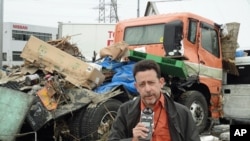Steve Herman says he had no time to reflect or get emotional during his coverage of the recent disaster in Japan. Now, back in his office in the VOA bureau in Seoul, Herman says the enormity of what he witnessed during his two weeks in Japan is still sinking in.
When reporting I'm "in the zone,” Herman said in a TweetChat Thursday. “I don't have time or desire to get emotional or subjective. That comes later.”
Herman noted that reporters face post-traumatic disorders just like police, firemen, soldiers and others who are exposed to a terrifying event or ordeal.
Praise for Japanese Character
Fielding dozens of questions in a web chat with VOA on Twitter (see text of chat here), Herman expressed admiration for how the Japanese people have handled the earthquake, tsunami and nuclear crisis.
“The Japanese are admirably stoic during the disasters,” said Herman. “ That's a good way to survive disasters but not a good way to prevent them.”
“It has overwhelmed the system. The disaster is so enormous. It'll take time to effectively help all those in need,” Herman said.
Answering one Tweet concerned that help is not reaching those most in need, Herman said those in the worst shape are frustrated at best.
"Some are angry," he said. “But they know everyone has to work together to survive. They will.”
Having lived in Japan for more than 16 years, Herman said the country has always reinvented itself for the better after calamities. He points to World War II, the Kanto Quake, and the Black Ships as examples.
“I think it may cause some big problems for the Japanese economy in the short term,” Herman said. He also said the disaster might lead to more political instability in Japan, leading to a possible return to power by the Liberal Democratic in 2012.
Role of Japanese Media Changing
Herman observed with sly amusement the relationship between the Japanese media and the country's bureaucrats, which in the past has been aptly described as "cozy." But as the crisis over the Fukushima nuclear power complex became became more heated, so did that relationship.
“I could write a book about Japan media relations with the government and TEPCO,” Herman said. “I’m sure somebody will.”
When asked if the current crisis will force Japan to rethink its nuclear industry, Herman said Japan lacks the natural resources to do so.
One Tweet asked about Japan’s willingness to ask for help from other countries. Herman answered that there had been offers from 150 countries, and this time, Japan accepted.
“Japan even took a donation from North Korea,” Herman said. Nepal, he added, is sending biscuits.








